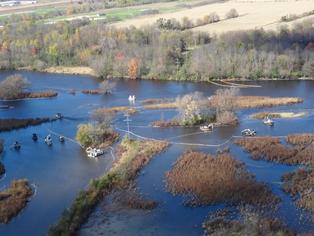 2011 clean up work of the Enbridge oil spill (credit: www.michigan.gov at http://bit.ly/29VG65p) 2011 clean up work of the Enbridge oil spill (credit: www.michigan.gov at http://bit.ly/29VG65p) The LWV Lake Michigan Region Annual Meeting in Douglas, Michigan back in 2011 included a paddleboat cruise on the Kalamazoo River, narrated by LWVMI delegate Suzanne Dixon. Instead of talking about the natural beauty or a thriving local ecosystem, our group learned about the environmental disaster caused by the oil spill from an Embridge pipe leak. Today, the U.S. EPA and the Dept. of Justice today announced a settlement with Enbridge Energy Limited Partnership (and several related companies) to resolve claims stemming from its 2010 oil spills in Marshall, MI and Romeoville, IL. Enbridge has agreed to spend at least $110 million on measures to prevent spills and improve operations across nearly 2,000 miles of its pipeline system in the Great Lakes region. These measures include:
Enbridge will also pay civil penalties totaling $62 million for Clean Water Act violations. Enbridge has already reimbursed the government for $57.8 million in cleanup costs from the Marshall spill and $650,000 for cleanup costs from the Romeoville spill, and Enbridge reportedly incurred costs in excess of $1 billion for required cleanup activities for these spills. “This was one of the largest inland oil spills in U.S. history when Enbridge discharged one million gallons of oil to Talmadge Creek near Marshall,” said acting EPA Regional Administrator Robert Kaplan. “Together with our state and local emergency responders, EPA was able to contain the spill before it reached the Great Lakes. After 22 months of arduous cleanup work, the Kalamazoo River finally reopened for recreational activities.” The government’s complaint alleges that on July 25, 2010, Enbridge's 30 inch-pipeline known as Line 6B discharged at least 20,082 barrels of crude oil, much of which entered Talmadge Creek and flowed into the Kalamazoo River which flows to Lake Michigan. Flooding caused by heavy rains pushed the discharged oil over the river's banks into its flood plains, and accelerated its migration over 35 miles downstream before it was contained. Line 6B, which originates in Griffith, IN, crosses the lower peninsula of Michigan and ends in Sarnia, Canada, has since been replaced with a new, larger pipeline, also known as Line 6B. The complaint also alleges that on September 9, 2010, another Enbridge pipeline, known as Line 6A, discharged at least 6,427 barrels of oil in Romeoville, IL, much of which flowed through a drainage ditch into a retention pond in Romeoville. There will be a 30 day public comment period on the consent decree. Information on how to comment will be available in the Federal Register and on the Department of Justice’s website: www.justice.gov/enrd/consent-decrees. More info on the settlement is available at https://www.epa.gov/enforcement/enbridge-clean-water-act-settlement |
Archives
December 2017
Categories
All
|

 RSS Feed
RSS Feed